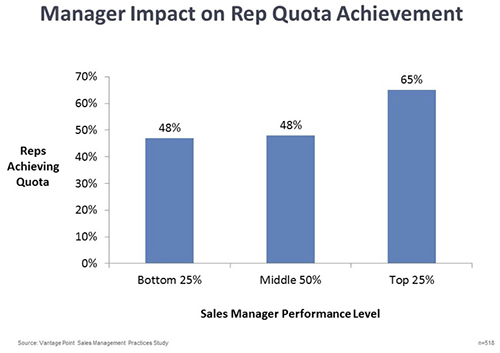Question: Why does senior leadership buy CRM?
For most organizations, the answer is to gain visibility into the activities of individual sales reps. There’s nothing wrong or nefarious about this strategy. In fact, we agree with it. If leaders can’t see what salespeople are doing, they can’t manage what their reps are doing. Nor can they make smart investments in improving sales capability. Basically, we buy CRM to measure and improve our front-line sellers’ performance.
With that goal in mind, CRM architecture has been refined over the years to do a better and better job of capturing and reporting seller activity. Sales calls, presentations, proposals, territory plans – every key sales rep activity and interaction is (ideally) captured in CRM so leaders can answer their most critical questions at a glance: Are my salespeople doing the right things? Are they winning the big deals? Are they tracking toward quota? Inquiring minds want to know.
This is fine, but we think CRM is woefully deficient in another key area. In the past decade, attention has shifted from seller activity to sales manager activity as a key driver of performance. Companies are realizing that sales success isn’t driven solely by sales rep performance, but also by effective sales management. To elevate sales performance, it’s not enough to improve the salespeople’s activities; we also need to improve the sales manager’s activities.
Management Matters
Here’s the problem: CRM has been expertly architected to manage sales reps’ activity – not sales managers’.
But wait… Don’t we already measure our sales managers’ performance? Well, kind of. Most sales managers are measured by looking at the aggregate performance of their teams. If their teams perform well, then the managers must be good, right? Maybe.
A team that consistently makes quota is not necessarily being led by an effective sales manager. In a recent research project, we found that in both low- and mid-performing sales teams (which achieved 76 percent and 99 percent of their targets, respectively), only 48 percent of reps hit their quotas. The same percentage of salespeople made their quotas on both low-performing and mid-performing teams. This means that sales managers of both groups were equally ineffective at developing their salespeople; the mid-performing teams simply benefitted from a few superstar salespeople that overcompensated for the lackluster performance of their peers. And their lackluster sales managers.

In high-performing sales teams (which achieved 115 percent of their target), 65 percent of the sellers made quota. And that’s the goal – to improve the performance of every sales rep. Improvement only comes from better sales management. And that only comes from sales managers executing their own key activities, such as assessing rep performance and coaching them to higher capability.
Which brings us back to CRM. If this technology is going to help us improve sales results going forward, it needs to evolve from a tool built around sales reps into a tool built around sales reps and sales managers. How many of us can measure, say, the number of hours our managers spend coaching, or the number of meetings our managers conduct to review territory plans? CRM is pretty ineffective at measuring critical management activity, but that’s increasingly where we find the leverage in sales performance.
If you, like us at Vantage Point, believe managers hold the keys to the quota achievement kingdom, you need to re-think the way you manage and measure your managers. Which means you need to re-think what you measure and report in CRM. Sales managers are now in the spotlight and CRM needs to shine in all the right places.
Jason Jordan is a founding partner of Vantage Point Performance, a global sales management training and development firm, and co-author of Cracking the Sales Management Code.


